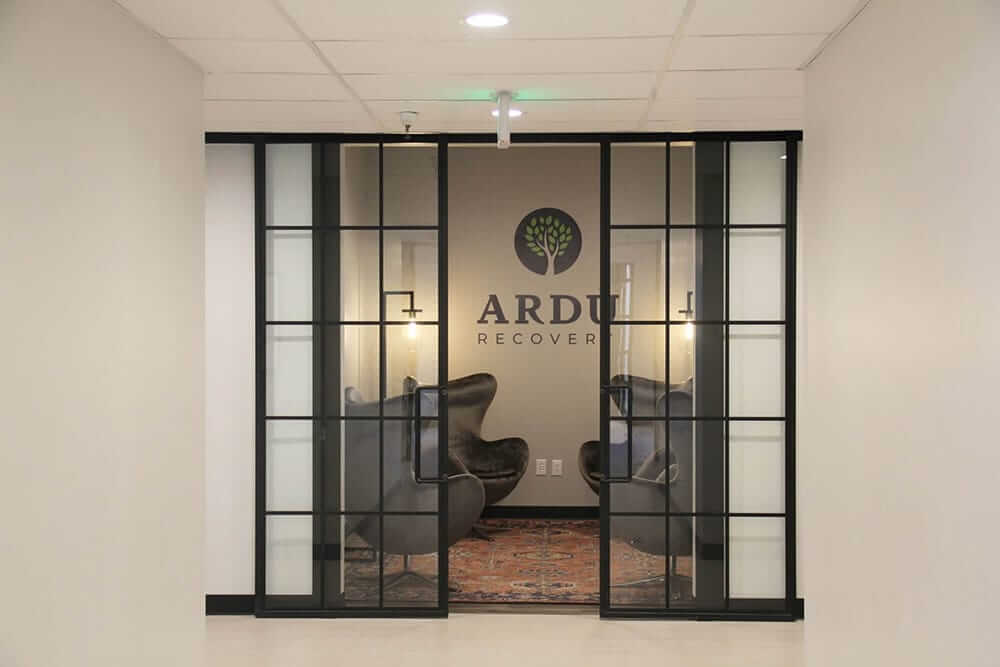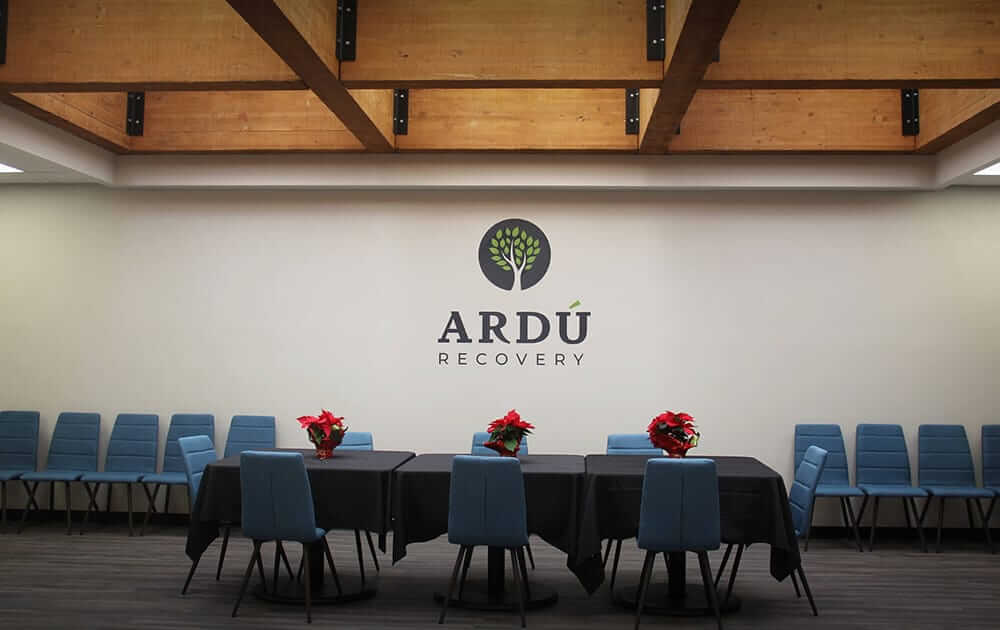Written by Drew Redd. Mina Draskovic, B.Psy., reviewed this content for accuracy.
Amphetamine addiction is a tough challenge, but professional help can turn the tide. At Ardu, we offer specialized drug rehab services to address every aspect of your addiction and guide you toward a lasting recovery.
Our evidence-based approach combines medical expertise, psychological support, and holistic therapies to provide a well-rounded treatment experience. Ardu’s dedicated team is committed to helping you rebuild your life and achieve long-term sobriety in a supportive, compassionate environment.
Amphetamine addiction is a serious substance use disorder (SUD) characterized by compulsive use of amphetamines despite negative consequences. Addiction develops when regular use of these stimulants changes the brain chemistry, causing physical dependence and psychological cravings.
The signs of amphetamine addiction manifest in different ways for different users, but they all affect their physical health, behavior, and social interactions. Here are some common indicators of amphetamine addiction:
If you or someone you know is exhibiting these signs, seek help from qualified healthcare providers or addiction specialists. Ardu’s drug rehab center for amphetamine addiction involves a comprehensive approach, including medical detox, behavioral therapies, and support groups. With proper care and support, recovery from amphetamine addiction can improve your quality of life and overall well-being.
Amphetamines encompass a broad category of stimulant drugs that affect the central nervous system. They are abused in both prescription and illicit forms.
Amphetamine addiction can be life-threatening. This powerful class of stimulants can have severe impacts on both physical and mental health, especially when used in high doses or over extended periods.
Amphetamine addiction ravages both body and mind, causing both immediate chemical harm and long-term neurological damage, as well as the risky behaviors that often accompany addiction. Here’s why addiction to amphetamine can be life-threatening:
The severe health risks associated with amphetamine addiction suggest this dependency cannot be easily overcome—not without professional help. Ardu Recovery Center offers close medical supervision to safely taper amphetamine use, alleviate withdrawal symptoms, and reduce the risk of long-term health consequences.
Don’t wait until the negative effects of amphetamine addiction become severe or life-threatening. Seek help early and give yourself or your loved one the best opportunity for successful recovery.
Amphetamine addiction is a serious condition that requires professional intervention. Attempting to quit amphetamine use alone can be dangerous. The complex nature of the addiction, coupled with its severe physical and psychological effects, makes it challenging to overcome without expert help.
Here’s why seeking help from a specialized addiction center such as Ardu is crucial for safe withdrawal and successful recovery:
Professional addiction centers conduct thorough physical and psychological assessments to create individualized treatment plans. This tailored approach addresses individual needs, co-occurring disorders, and personal circumstances, significantly improving the chances of successful long-term recovery.
There’s no better place to start your road to recovery than at Ardu Recovery Center.
The first step to overcoming amphetamine addiction is detox.
We offer the most comprehensive and effective amphetamine detox and recovery program available. Our state-of-the-art detox center provides 24/7 monitoring and clinical support to ensure the safest and most comfortable detox process possible.
What sets us apart is our unparalleled range of specialized treatments:
At Ardu, we don’t just treat addiction; we provide a complete transformation. Our aftercare planning is thorough and personalized, ensuring that the progress made during your stay with us continues long after you leave. Our track record of success and our commitment to cutting-edge, comprehensive care make us the clear choice for those serious about overcoming amphetamine addiction.
“Absolute best staff here! They care! Their detox is amazing! They keep you safe! They have amazing therapists! And IOP of theirs is just as good! I recommend many here and forever will! My other family!”
Overcoming amphetamine addiction is a journey that continues well beyond detox. Our rehabilitation program supports you in building a strong foundation for long-term recovery after you’ve successfully completed the detoxification process.
Our approach to amphetamine rehab is rooted in evidence-based practices and tailored to meet your individual needs. What sets Ardu apart is our holistic approach to treatment. Our experienced team of medical professionals, therapists, and addiction specialists work together to tackle the physical, psychological, and social aspects of amphetamine addiction. This comprehensive care includes treating co-occurring mental health conditions, rebuilding family relationships, and developing essential life skills for a successful, drug-free future.
Our facility offers a serene and supportive environment conducive to healing and personal growth. We combine traditional therapies with innovative approaches such as experiential therapies, ensuring an effective treatment experience that caters to diverse needs and preferences.
Each person’s path to recovery is unique, which is why we offer a range of treatment options, from intensive inpatient care to flexible outpatient programs. This allows us to provide the right level of support for your specific situation and recovery goals.
Inpatient treatment involves living at the treatment facility 24/7 for the duration of the program. This provides a fully immersive recovery experience. The structured, drug-free environment of inpatient care removes individuals from triggers and temptations in their daily lives. This can be crucial for those in the early stages of recovery.
Our intensive inpatient programs offer round-the-clock care and support from medical professionals and addiction specialists. This constant supervision is beneficial for those with severe addiction or co-occurring mental health issues. Typical inpatient programs last 30 to 90 days, though some may extend longer depending on individual needs.
Here’s why you should choose an inpatient treatment program:
Outpatient treatment allows individuals to live at home while attending regular treatment sessions at a facility. This provides more flexibility and independence. Typical outpatient programs involve 10–12 hours of treatment per week, spread across several days. Patients can maintain work, school, or family responsibilities while receiving treatment. The duration of outpatient treatment varies from a few months to a year or more, depending on individual needs and progress. This extended time frame allows for ongoing support as individuals navigate recovery in their daily lives.
The advantages of an outpatient treatment include:
The choice between inpatient and outpatient care is highly individual. Our team works closely with each client to assess their needs, considering factors such as addiction severity, home environment, work commitments, and personal preferences. This personalized approach ensures that each individual receives the most appropriate level of care for their unique situation, maximizing their chances of successful recovery from substance abuse.
Reach out to us today to learn more about our personalized treatment options and let us help you build a brighter tomorrow.








Entering an amphetamine detox center is the crucial first step toward breaking free from stimulant addiction. Our expert team of addiction specialists and healthcare professionals is committed to guiding you through every stage of treatment, from initial detox to ongoing recovery support.
We know that SUDs come in many forms, each with its own unique challenges. Whether you’re struggling with amphetamines, opioid addiction, alcohol use disorder (AUD), or any other substance, our experienced team provides compassionate, personalized care tailored to your specific needs.
To enroll in an Ardu Adderall detox program, contact Ardu Recovery Center online or via phone at (801-810-1234). Our treatment providers will work closely with you to develop a personalized recovery plan that meets your unique needs during the detox process and beyond.
Visit our admissions process page and reach out to our admissions team for more information on how to get started.

Drew Redd is the executive director of Ardu Recovery Center and is dedicated to empowering people on their journey to sobriety.
Amphetamine toxicity develops when the body and brain are overwhelmed by the drug. It often results in organ damage. Symptoms range from mild (such as increased heart rate and agitation) to severe (including hyperthermia, seizures, and psychosis), and in extreme cases, it is life-threatening.
For amphetamine toxicity, treatment typically involves supportive care and symptom management.
The focus is on addressing immediate health risks and stabilizing the patient. In a residential treatment setting, medical professionals can closely monitor vital signs and adjust treatment as needed.
The best treatment for amphetamine toxicity involves a comprehensive approach combining medical intervention and supportive care in a controlled environment, often an inpatient rehab or hospital setting. This typically includes:
The goal is to manage acute symptoms, prevent complications, and support the body’s natural detoxification process. After the acute phase, patients often transition to a structured recovery program to address the underlying substance use disorder and any co-occurring mental health conditions.
Therapeutic doses for amphetamine are influenced by the specific medication, individual patient needs, and the condition being treated. For ADHD treatment in adults, typical doses might be:
For narcolepsy, doses may be higher.
Always follow a doctor’s prescription and never adjust doses without medical supervision.
Ritalin (methylphenidate) is not an amphetamine, although it’s often confused with one because they have similar effects. Both are central nervous system stimulants used to treat ADHD, but they have different chemical structures and mechanisms of action. Ritalin works primarily by blocking the reuptake of dopamine and norepinephrine, while amphetamines also stimulate the release of these neurotransmitters.
Ritalin can have similar therapeutic benefits and potential for misuse, so it’s also a controlled substance. In treating stimulant use disorders, whether involving Ritalin or amphetamines, the approach often includes cognitive behavioral therapy, support groups, and sometimes medication-assisted treatment to manage withdrawal symptoms and cravings.
Amphetamines alter brain chemistry, primarily affecting the dopamine system. They increase the release of dopamine and norepinephrine while blocking their reuptake, leading to heightened concentration, alertness, and euphoria. This flood of neurotransmitters is responsible for the drug’s stimulant and addictive properties.
Long-term use alters brain structure and function, potentially leading to cognitive impairments, mood disorders, and addiction. Amphetamines also affect other neurotransmitter systems, influencing mood, appetite, and sleep patterns. These changes persist even after stopping use. The recovery process often involves allowing the brain time to heal and restore normal neurotransmitter function.
Amphetamine use depletes dopamine over time. Initially, amphetamines cause a surge in dopamine levels, creating feelings of euphoria and increased energy. With repeated use, the brain’s natural dopamine production is disrupted. This results in depleted dopamine stores and decreased sensitivity to dopamine, leading to fatigue, depression, and anhedonia (inability to feel pleasure) when not using the drug.
Taking Ritalin without ADHD can increase your energy and focus and cause euphoria. It can also cause adverse reactions such as anxiety, insomnia, increased heart rate, and blood pressure. Long-term misuse often leads to addiction, cardiovascular problems, and mental health issues. Unlike in ADHD patients, where Ritalin helps normalize brain function, in those without ADHD, it can create an imbalance in brain chemistry.
Amphetamine drugs are primarily used to treat attention deficit hyperactivity disorder (ADHD), improve focus, reduce impulsivity, and manage hyperactivity. They’re also prescribed for narcolepsy to combat excessive daytime sleepiness. In some cases, amphetamines may be used to treat obesity (short-term), although this is less common because it produces side effects and has a high risk of addiction.
How to recognize alcohol poisoning
Rehab services tailored for men